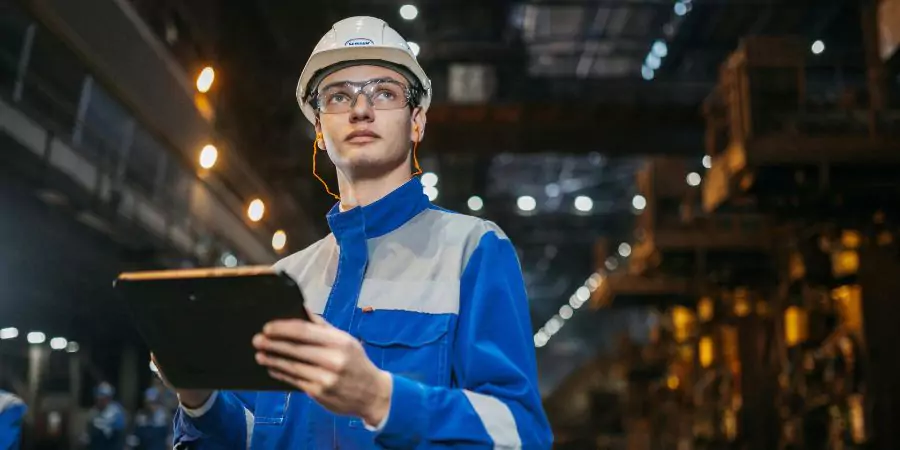Industry 4.0 Leaders are changing the way companies operate in today’s data-driven, interconnected world. These visionaries aren’t simply changing their ways to adapt to the future, they are creating it. Utilizing technologies like AI, IoT, robotics as well as cloud-based computing, people and businesses are creating an increasingly efficient, smarter industrial environment. As we look deeper into what is known as the Fourth Industrial Revolution, it’s obvious that leading in this field requires a unique mix of strategy, innovation, and digital proficiency.
The Growth of Industry 4.0
The 4th Industrial Revolution, commonly called Industry 4.0, is characterized by the merging of modern technology that blurs the boundaries between the digital and actual worlds. The movement is driven by automated systems, smart systems along with real-time analysis of data that allow companies to make faster, more informed decisions.
Industry 4.0 isn’t something that is in the distant future, it’s happening right now. From factories that employ predictive maintenance that is powered by machine learning, to logistics firms improving delivery routes with AI The digital transformation is real, tangible and growing.
Visionaries Behind the Revolution: Meet the Industry 4.0 Leaders
The current technological landscape has been formed by a new breed of leaders. Leaders who don’t only comprehend technology, but integrate the technology in their own business model. They are CEOs engineers, CTOs, entrepreneurs, and data scientists who are driving change on every conceivable level.
What differentiates them isn’t just their technical skills but also a grasp of how to integrate innovation with customer requirements capability of workers, as well as global economic developments. They recognize that true the role of leadership Industry 4.0 goes beyond adopting tools. It requires rethinking whole processes and the value chains.
Integrating Digital Transformation Strategies for Long-Term Growth
Digital transformation is the underlying concept industry 4.0. But transformation doesn’t happen overnight. It requires a well-structured and focused approach to integrating digital capabilities across all departments. Leaders who are successful understand the importance of drafting an appropriate Digital Transformation Strategy that is in line with their company’s mission as well as the long-term goals.
Companies such as Siemens, GE, and Bosch have established themselves as benchmarks in this sector. The strategies they employ include AI-powered digital twins, diagnostics and adaptive manufacturing systems, all managed by skilled leaders who have clear plans for the future.
How Smart Manufacturing Technologies Are Redefining Efficiency
The heart of Industry 4.0 is Smart Manufacturing Technologies a set of interconnected systems and tools which improve productivity, quality and scaling. They include 3D printing, robotics, sensors and cyber-physical systems which are autonomous and adaptable.
Industry 4.0 leaders are using these technologies, not only to increase output, but also to reduce waste, simplify production chains and increase worker safety. The result is often positive: lower downtime, speedier production cycles, and improved quality of product.
Cultivating Workforce 4.0 for the New Era
A technological revolution cannot be completed without the human factor. Since automation as well as AI are becoming more commonplace as they become more commonplace, the job of the human worker is changing. Industry 4.0 leaders are aware of this shift as they invest into Workforce 4.0 initiatives that emphasize upskilling as well as reskilling and continuing learning.
They’re encouraging a culture that encourages constant improvement and agility which allows employees to work with machines, analyze data, and take strategic decisions. Mentorship programs, training and teams that cross-functionalize are the key elements of this strategy.
The Role of AI-Driven Supply Chains in Enhancing Competitiveness
The global supply chain is under greater stress than ever before. From disruptions caused by pandemics to shifts in geopolitics, adaptability is vital. This is the reason AI-Driven Supply Chains are now a key area of focus for Industry 4.0 executives.
They use real-time data to predict demand, spot bottlenecks and improve the inventory. Companies that use AI-powered logistics do not just save expenses, but also gain advantage in the marketplace through their responsiveness and adaptability.
Leveraging Industrial IoT Platforms for Real-Time Insights
Another characteristic that is characteristic of industry 4.0 includes the usage of Industrial IoT Platforms to collect and analyze information that is generated by connected devices. These platforms enable businesses to track equipment, control the consumption of energy, and guarantee conformity in real-time.
Industry 4.0 executives use this approach based on data to spot weaknesses, identify the failure of equipment and simplify processes. It’s not about just collecting data, it’s about making that data practical information.
Implementing Cybersecurity in Industrial Systems to Safeguard Innovation
With increased connectivity comes more risk. As digital networks grow as do the threats to the industrial infrastructure. The most forward-thinking leaders consider Cybersecurity in Industrial Systems as a crucial element of their plan.
They have implemented solid frameworks to safeguard intellectual property, secure customer information, and guarantee continuous operation. From access control and encryption to AI-powered threat detection cybersecurity isn’t just a matter of choice anymore. It’s essential.
Achieving the foundation for a Sustainable Future with “Green Industrial Solutions”
Sustainability is becoming increasingly an important indicator of performance for companies. Green Industrial Solutions are growing in popularity as businesses strive to comply with environmental standards, reduce their carbon footprints and attract environmentally conscious consumers.
Industries 4.0 leaders are integrating sustainability into their business activities. In the form of energy-efficient systems circular manufacturing or renewable energy integration, they’re proving that green and digital transitions can be a part of the same.
The Road Ahead: What Defines Tomorrow’s Industry 4.0 Leader?
The role of leadership changing just like the technology itself. In the future, leaders in Industry 4.0 executives will need to manage the need for innovation with ethical principles, automation and employment efficiency and sustainability. They’ll have to be alert, be collaborative across ecosystems, and continually review their strategies.
These leaders aren’t just creating the future of industries but are also creating an enduring legacy of tech-enabled and inclusive advancements that will benefit future generations.
Conclusion
While the Fourth Industrial Revolution continues to take place, Industry 4.0 Leaders are on the leading edge of a major change. Their vision, dedication and strategic thinking have turned challenges into opportunities and concepts into action. From AI-powered logistics to human-centric automation the world is watching these pioneers redefine what is possible in the modern world of business.







